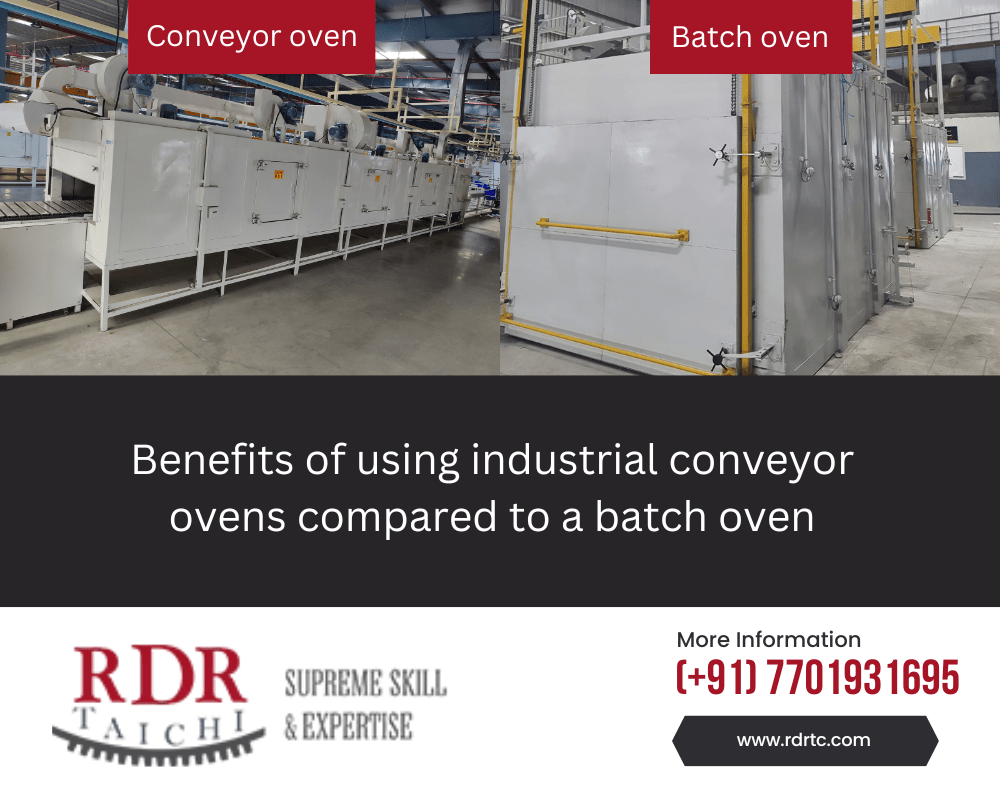Industrial conveyor ovens and batch ovens are both types of industrial ovens used for various heating and baking processes. Each type has its own set of advantages and disadvantages. Here are some benefits of using conveyor ovens compared to batch ovens:
- Continuous Process: Conveyor ovens allow for a continuous and automated process where products are placed on a moving conveyor belt and pass through the oven in a continuous manner. This leads to higher production rates and more consistent processing times compared to batch ovens, where each batch must be loaded and unloaded separately.
- Higher Throughput: Conveyor ovens can handle larger quantities of products in a given time frame, making them ideal for high-volume production environments. Batch ovens, on the other hand, may have limitations in terms of batch size and can be less efficient for large-scale production.
- Consistent Quality: The continuous movement of products through a conveyor oven ensures more uniform heating and baking, resulting in consistent product quality. In batch ovens, variations in temperature and air circulation might occur between different batches, potentially leading to inconsistencies in the final product.
- Labor Efficiency: Conveyor ovens require less manual labor since they are designed for automated loading and unloading. Batch ovens often require operators to load and unload each batch individually, which can be more labor-intensive and time-consuming.
- Space Utilization: Conveyor ovens are typically designed to take up less floor space compared to multiple batch ovens that might be needed to achieve the same throughput. This can be especially beneficial in facilities with limited space.
- Energy Efficiency: Conveyor ovens can be designed with efficient heating and insulation systems to minimize energy wastage. In batch ovens, there can be more heat loss during the loading and unloading process, potentially leading to higher energy consumption.
- Process Control: Conveyor ovens often come equipped with advanced process control systems that allow for precise adjustment of parameters like temperature, belt speed, and airflow. This level of control can result in better product consistency and repeatability compared to batch ovens.
- Reduced Downtime: Since conveyor ovens offer continuous processing, there is typically less downtime between batches, resulting in higher overall equipment utilization. Batch ovens require downtime for loading, unloading, and heating/cooling cycles between batches.
- Automated Monitoring: Conveyor ovens can be integrated with monitoring and data logging systems to track and record process parameters, ensuring adherence to quality standards and facilitating process optimization. This can be more challenging to implement in batch ovens.
- Customization: Conveyor ovens can be designed to fit specific production needs, including variations in temperature zones, belt configurations, and heating methods. This level of customization can lead to optimized processing for different types of products.
It’s important to note that the choice between industrial conveyor ovens and batch ovens depends on the specific requirements of the production process. While conveyor ovens offer numerous benefits for continuous and high-volume processing, there are scenarios where batch ovens might be more suitable, such as when processing smaller quantities or when the process requires more specialized control over temperature.




